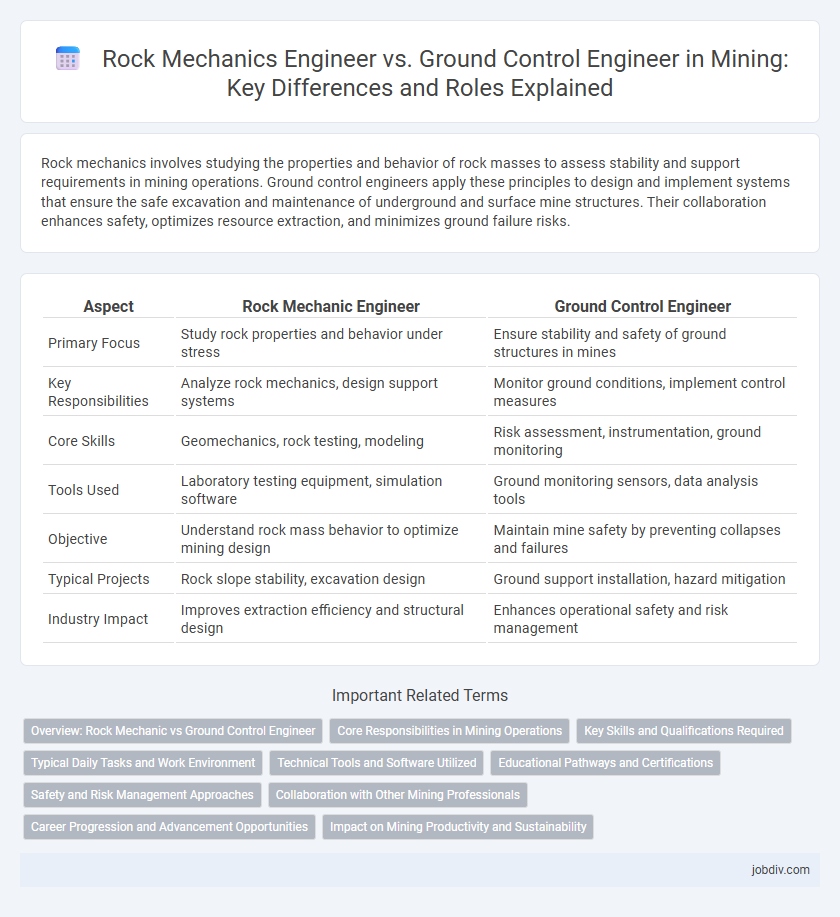Rock mechanics involves studying the properties and behavior of rock masses to assess stability and support requirements in mining operations. Ground control engineers apply these principles to design and implement systems that ensure the safe excavation and maintenance of underground and surface mine structures. Their collaboration enhances safety, optimizes resource extraction, and minimizes ground failure risks.
Table of Comparison
| Aspect | Rock Mechanic Engineer | Ground Control Engineer |
|---|---|---|
| Primary Focus | Study rock properties and behavior under stress | Ensure stability and safety of ground structures in mines |
| Key Responsibilities | Analyze rock mechanics, design support systems | Monitor ground conditions, implement control measures |
| Core Skills | Geomechanics, rock testing, modeling | Risk assessment, instrumentation, ground monitoring |
| Tools Used | Laboratory testing equipment, simulation software | Ground monitoring sensors, data analysis tools |
| Objective | Understand rock mass behavior to optimize mining design | Maintain mine safety by preventing collapses and failures |
| Typical Projects | Rock slope stability, excavation design | Ground support installation, hazard mitigation |
| Industry Impact | Improves extraction efficiency and structural design | Enhances operational safety and risk management |
Overview: Rock Mechanic vs Ground Control Engineer
A Rock Mechanic specializes in analyzing rock properties, stability, and behavior to support safe excavation and mining operations. Ground Control Engineers focus on designing and implementing systems to maintain mine safety by preventing ground failures and managing stress distribution. Both roles are essential for effective ground stability management but differ in their approach, with Rock Mechanics emphasizing geological analysis and Ground Control Engineering concentrating on structural solutions.
Core Responsibilities in Mining Operations
Rock mechanics specialists analyze rock mass properties to assess stability and predict deformation in mining excavations, ensuring safe tunnel design and slope stability. Ground control engineers develop and implement reinforcement strategies, including the installation of supports and monitoring systems, to mitigate ground movement risks during mining operations. Both roles collaborate to maintain structural integrity, but rock mechanics primarily focuses on geological assessment while ground control engineers emphasize practical stabilization solutions.
Key Skills and Qualifications Required
Rock Mechanics specialists require expertise in geotechnical analysis, rock mass classification, and stress-strain behavior to assess rock stability effectively. Ground Control Engineers must possess strong skills in ground support design, monitoring techniques, and risk management to ensure safe excavation and prevent ground failures. Both roles demand proficiency in numerical modeling software, a solid understanding of mining methods, and relevant engineering degrees such as mining or civil engineering.
Typical Daily Tasks and Work Environment
Rock Mechanics specialists analyze rock properties to assess stability and design support structures, frequently conducting field tests and laboratory experiments. Ground Control Engineers focus on monitoring ground movement, implementing support systems, and ensuring mine safety through data analysis and risk assessment. Both roles operate primarily underground within mining sites, collaborating closely with geologists, engineers, and safety personnel to optimize excavation stability and worker safety.
Technical Tools and Software Utilized
Rock mechanics specialists primarily use numerical modeling software such as FLAC3D and Phase2 to analyze rock mass behavior, focusing on rock properties and stress distribution. Ground control engineers rely on integrated geotechnical software like Rocscience, SAP2000, and Surpac for stable excavation design and support system planning. Both professionals utilize field monitoring tools including extensometers, stress meters, and laser scanners for precise data collection and analysis.
Educational Pathways and Certifications
Rock Mechanics specialists typically pursue degrees in geology, mining engineering, or civil engineering with a focus on rock behavior and stability analysis. Ground Control Engineers often obtain certifications such as the Certified Ground Control Professional (CGCP) and emphasize coursework in geotechnical engineering and subsurface support systems. Both professions require continuous education in mine safety regulations and advanced modeling techniques to optimize underground excavation and minimize collapse risks.
Safety and Risk Management Approaches
Rock mechanics specialists analyze rock behavior to predict and mitigate structural failures, applying principles of geomechanics for enhanced mine safety. Ground control engineers design and implement support systems such as rock bolts, shotcrete, and anchors to stabilize mine openings and prevent collapses. Both roles prioritize hazard identification and risk assessment, but ground control engineers emphasize practical reinforcement strategies to manage ground-related risks effectively.
Collaboration with Other Mining Professionals
Rock Mechanics specialists analyze rock behavior and stability, collaborating closely with Ground Control Engineers to design effective support systems that ensure mine safety. Ground Control Engineers integrate data from geotechnical surveys and rock mechanics models to implement reinforcement strategies and monitor ground conditions in real time. Their collaboration with mining geologists, structural engineers, and blasting experts optimizes overall mine planning and reduces risk of collapses or hazardous events.
Career Progression and Advancement Opportunities
Rock mechanics specialists often start with detailed analysis of rock properties and stress factors, advancing into roles that lead complex geotechnical projects or research positions. Ground control engineers focus on designing and implementing support systems to stabilize mine structures, with career paths progressing toward senior engineering roles or operational management. Both careers offer opportunities in consulting, academia, and leadership, but ground control engineers may experience faster advancement due to their critical role in ensuring mining safety and productivity.
Impact on Mining Productivity and Sustainability
Rock mechanics specialists analyze rock behavior and stability to design safer excavation methods, directly reducing operational risks and downtime in mining. Ground control engineers implement these analyses through practical reinforcements like supports and anchors, enhancing mine stability and preventing collapses that disrupt productivity. Their combined expertise fosters sustainable mining practices by minimizing environmental impact and extending mine lifespan through efficient resource management.
Rock Mechanic vs Ground Control Engineer Infographic

 jobdiv.com
jobdiv.com